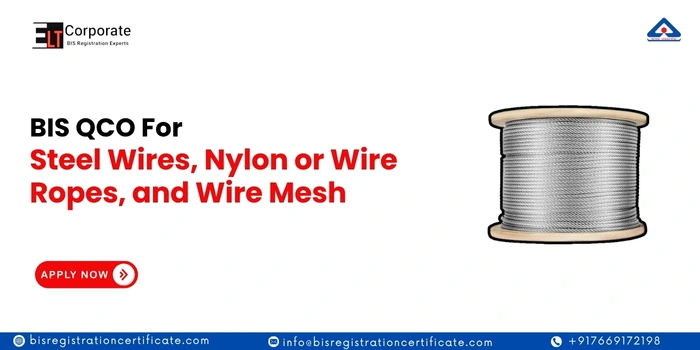India is raising the bar for product quality across key sectors like construction, engineering, and manufacturing. To support this vision, the government has introduced mandatory BIS certification under newly issued Quality Control Order for required products such as Steel Wires, Nylon or Wire Ropes, and Wire Mesh.
These materials now require strict compliance with relevant Indian Standards and must display the ISI mark to be legally manufactured, sold, or imported in the country. For businesses, This marks a crucial shift-non compliance can result in blocked shipments, penalties, or loss of market access.
This blog provides a clear overview of the BIS QCO framework, applicable standards, and the certification process to help you to lead the way.
What is a BIS Quality Control Order?
A Quality Control Order is a government notification issued by the Ministry of Steel or other concerned ministries under the Bureau of India Standards Act, 2016. It mandates compulsory BIS certification for specific products before they can be manufactured, sold, or imported in India.
Once a QCO is issued, the product must conform to the relevant India Standards (IS) and bear the ISI mark.
Read More: What Is QCO In BIS
BIS QCO for Steel Wires, Nylon or Wire Ropes, and Wire Mesh
The Ministry of Steel has recently issued QCOs covering the Following product categories:
- Steel Wires: Steel wires are extensively used in construction, automotive, power, and industrial applications. The QCO mandates that all steel wire products meet Indian Standards specifications, such as:
- IS 4454: Steel Wire for Springs
- IS 280: Mild Steel Wire for General Engineering Purpose
- Nylon or Wire Ropes: Nylon and metallic wire ropes are used in material handling, elevators, construction, and marine industries. Common applicable standards include:
- IS 2266: Steel Wire Ropes for General Engineering purposes
- IS 5175: Nylon Ropes – Specification
All ropes must be BIS certified and bear the ISI mark for legal sale or use in India.
- Wire Mesh: Wire mesh is crucial for fencing, filtration, construction reinforcements, and more. The QCO ensures that these meshes are manufactured as per:
- IS 1566: Hard-Drawn Steel Wire Fabric for Concrete Reinforcements
- IS 16069: Welded Steel Wire Mesh for General Purpose
Scope Of The BIS QCO for Steel Wires, Nylon or Wire Ropes, and Wire Mesh
BIS QCO for Steel Wires, Nylon or Wire Ropes, and Wire Mesh offers several key benefits to manufacturers, consumers, and regulators in India. Here’s a breakdown:
- Safety Assurance: BIS certification ensures the appliance meets strict Indian standards for safety, quality, and performance, protecting consumers for faulty or dangerous products.
- Consumer confidence: The ISI mark helps buyers easily find reliable and approved appliances, building trust in the products and brands.
- Legal Compliance: Certification is mandatory for market access in India. It helps manufacturers avoid legal issues and penalties.
- Energy Efficiency: Certified appliances are tested for energy performance, leading to lower electricity bills and supporting environmental sustainability.
- Enhanced Marketability: BIS Certificate boosts brand reputation and makes products.
Documents Required for BIS QCO for Steel Wires, Nylon or Wire Ropes, and Wire Mesh
Applying for BIS QCO for Steel Wires, Nylon or Wire Ropes, and Wire Mesh need to submit the following key documents:
- BIS Application Form
- Factory Registration Form/Udyam/MSME Certificate
- Pan & GST Certificate of the Manufacturer
- Test Report from a BIS-recognised laboratory
- In-house Quality Control Details
- Manufacturing Process Flowchart
- Layout plan of the Manufacturing Unit
- Authorisation Letter (if submitted by a consultant or agent)
Read More: Documents Required For BIS Registration
Step-by-Step BIS QCO for Steel Wires, Nylon or Wire Ropes, and Wire Mesh
Follow the steps mentioned below to get BIS QCO for Steel Wires, Nylon or Wire Ropes, and Wire Mesh:
- Application Submission: Register on the BIS portal and submit the application form along with all required documents.
- Documents Review: BIS reviews your application and supporting documents for completeness and accuracy.
- Factory Audit/Inspection: BIS officials conduct an on-site inspection of your manufacturing facility to verify production capability, quality control systems, and follow to the relevant Indian Standards.
- Product Sampling and Testing: During the audit, BIS inspection collects product samples, which are then tested in a BIS-recognised laboratory for compliance with IS 8637 (H-Acid) or IS 18340 (Vinyl Sulphone).
- Evaluation of Test Result: BIS evaluatory test reports and the audit findings. If the products meet all prescribed standards, the process moves forward.
- Grant of License: Upon successful verification, BIS issues a license authorising the use of the ISI mark on your product packaging, signifying compliance.
- Post-Certification Surveillance: BIS conducts regular monitoring audits and market sampling to ensure continued follow with standards. Non-compliance may lead to delay or termination of the license.
Read More: Process for getting BIS for Certification
Penalty for Non-Compliance
Non-compliance with BIS QCO can result in:
- Seizure of goods
- Fines up to Rs 2 lakhs or more
- Imprisonment up to 2 years
Additionally, non-compliant imports may be denied clearance by Indian Customs.
Final Thoughts
The implementation of BIS QCOs For steel Wires, Nylon or Wire Ropes, and Wire Mesh is a significant step toward quality assurance and consumer safety. For businesses, It is both a regulatory obligation and a growth opportunity. Timely compliance with BIS norms not only avoids legal troubles but also enhances brands credibility in the competitive India market.
If you’re a manufacturer or importer looking for BIS certification support, consider consulting a BIS compliance expert to navigate the process smoothly.
Is BIS Certification Mandatory For Importers?
Yes. Importers must ensure that the products they bring into India are BIS certified as per the applicable IS standards mentioned in the QCO.
How Can A Manufacturer Obtain BIS Certification?
Manufacturers must apply online, get their product tested at a BIS-approved lab, undergo a factory inspection, and meet all compliance criteria set by BIS.
When Does The BIS QCO For These Products Come Into Effect?
Each BIS QCO notification includes an effective date, after which compliance becomes mandatory. Always refer to the latest Gazette notification.








